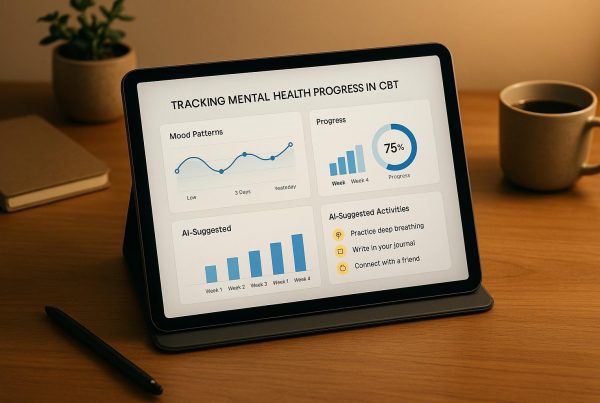AI-powered tools are reshaping mental health support, offering affordable, 24/7 access to habit-building techniques rooted in Cognitive Behavioral Therapy (CBT). Here’s what you need to know:
- Personalization: AI adapts in real-time, using methods like CBT, DBT, and NLP to meet individual needs.
- Accessibility: Costs up to 80% less than traditional therapy, starting at $20/month.
- Real-Time Feedback: Immediate guidance helps users navigate challenges as they arise.
- Scalability: Supports many users simultaneously, offering modes like quick sessions or privacy-enhanced chats.
Quick Comparison:
| Aspect | AI-Powered CBT Modules | Standard CBT Methods |
|---|---|---|
| Availability | 24/7 access | Scheduled sessions only |
| Cost | ~$20/month | $150–$300/session |
| Response Time | Immediate | Delayed until next session |
| Personalization | Real-time adjustments | Periodic updates |
| Privacy | Anonymity options | In-person interaction |
AI tools are ideal for those seeking affordable, flexible, and private support for habit formation. However, complex mental health issues may still require traditional therapy. Combining both methods can offer the best results for building and maintaining habits.
Why Bad Habits Stick| 5 Habit Building AI Apps – Powered by …
1. AI-Powered CBT Features
AI-powered CBT tools are transforming how people build habits, offering a more tailored and accessible therapeutic experience through four main components.
Personalization
AI uses established methods like CBT, DBT, NLP, and performance coaching to adapt its support to each user. By analyzing interactions and spotting patterns, it adjusts strategies in real time to fit individual needs.
Accessibility
These platforms make therapy more reachable by providing a cost-effective option that’s available 24/7. This ensures users have support whenever they need it most during habit-building moments.
Real-Time Feedback
AI systems offer immediate responses, creating a continuous feedback loop for habit development. Psychologist Vera Martins shares her experience:
"I shared a very specific topic and was guided through relevant questions, practical tips and actionable steps. The process was very natural and, above all, it was very useful." [1]
Scalability
AI modules can handle a large number of users at once without losing the personal touch. Studies show men are three times more likely to open up to AI-based therapy compared to human therapists [1]. These systems offer various modes to meet different needs:
| Mode Type | Primary Focus | Key Benefits |
|---|---|---|
| Default | Comprehensive CBT | Full therapeutic toolkit |
| Microcoaching | Quick Support | 5-minute focused sessions |
| Embodiment | Physical Integration | Visualization techniques |
| Incognito | Privacy-Enhanced | Auto-deletion after 30 minutes |
Hali, a Strength & Mobility Coach, describes her experience with AI therapy:
"Aidx has been surprisingly human in identifying problems & asking the right questions. But faster! I got sucked into the conversation like I was talking to an educated & empathetic therapist & every suggestion sent me to where I needed to go." [1]
These features combine to create a system that helps users build habits effectively and consistently.
2. Standard CBT Methods
Traditional CBT uses structured frameworks to help individuals build habits. However, it often struggles to keep up with the demands of today’s fast-paced environment.
Personalized Treatment
Traditional CBT tailors treatment plans through detailed assessments and regular sessions. Therapists work to identify triggers and behaviors, but this process can take significant time. In contrast, AI-powered tools offer quicker adjustments and feedback.
Barriers to Accessibility
Several challenges can limit the effectiveness of traditional CBT when it comes to forming habits:
| Factor | Challenge | Impact |
|---|---|---|
| Cost | Sessions cost about 5× more | Reduces affordability |
| Availability | 50% of therapy seekers face wait times [1] | Delays access to treatment |
| Schedule | Limited to office hours | Inconvenient for many |
| Location | Requires in-person attendance | Adds travel time and costs |
Delayed Support
Traditional CBT operates on a scheduled session model, meaning support is not always available when it’s needed most. This can leave individuals without help during critical moments in their habit-building journey, unlike AI tools that offer real-time assistance.
Limited Scalability
The one-on-one nature of traditional CBT makes it harder to expand access. Factors like therapist availability, fixed session durations, and geographic limitations often result in long waitlists. Many people seeking therapy face delays in starting their treatment [1].
Self-Directed Practice
Traditional CBT encourages self-reliance by assigning clients tasks to practice independently. While this builds autonomy, it can leave individuals without immediate guidance during challenging situations.
sbb-itb-d5e73b4
Benefits and Limitations
Looking at the strengths and challenges of AI-powered and traditional CBT methods helps clarify their roles in habit formation.
| Aspect | AI-Powered CBT Modules | Standard CBT Methods |
|---|---|---|
| Availability | Accessible 24/7 | Limited to scheduled sessions |
| Cost | Starts at $20/month (about 80% less) | $150–$300 per session |
| Response Time | Immediate support | Delayed until next session |
| Personalization | Adjusts in real time | Periodic updates |
| Privacy | Offers more anonymity | In-person interaction |
| Consistency | Automated reminders | Relies on client motivation |
This breakdown highlights how each approach serves different needs.
Advantages of AI-Powered Modules
Data shows that 75% of people would consider using AI-driven support [1]. Here’s why:
- Real-Time Updates: AI learns and adjusts based on user interactions, tailoring support more effectively over time.
- No Scheduling Hassles: These tools remove barriers like timing conflicts and location issues.
- Boosted Engagement: Automated reminders and check-ins help users stay on track with their goals.
Strengths of Traditional CBT
While AI offers convenience and personalization, traditional CBT has its own strong points:
- Handling Complex Issues: Human therapists are better suited for addressing severe or intricate mental health challenges.
- Emotional Cues: In-person sessions allow therapists to pick up on subtle body language and emotional signals.
- Building Trust: A strong therapist-client bond can improve long-term outcomes.
These benefits mean the choice often depends on what a person values most in their treatment.
Key Factors for Choosing
The best results often depend on:
- Time Flexibility: AI tools are ideal for those with packed schedules.
- Budget: AI options are more affordable, making mental health support accessible to more people.
- Privacy Needs: AI-driven interactions can feel more private and anonymous.
- Complexity of Issues: Those with more severe challenges may benefit from combining both methods.
Voice-enabled AI platforms are also making support easier to use, allowing natural, hands-free conversations during daily tasks.
Combining AI-powered tools with traditional therapy could provide the most well-rounded support for creating and maintaining habits.
Conclusion
AI-driven platforms combine advanced technology with proven therapeutic practices to improve mental health tools and make them more accessible and affordable. These systems focus on habit-building through tailored and personalized support.
Using Adaptive Therapeutic Intelligence (ATI), these platforms blend technology with research-backed methods to provide ongoing, customized assistance. Features like voice-enabled interfaces and real-time adjustments help overcome common obstacles in accessing mental health support, encouraging the development of positive habits.
As AI continues to evolve, its potential to aid mental health and personal growth grows, offering new ways to create lasting, meaningful change.
FAQs
How do AI-powered CBT modules adapt to individual needs and goals?
AI-powered CBT modules, like those offered by Aidx.ai, adapt to individual needs by creating personalized growth journeys tailored to each user. These journeys include customized check-ins, reminders, and tools designed to help manage stress, build habits, and stay accountable to goals.
Aidx.ai also supports businesses by offering employee wellness programs with features like customizable plans and insights for managers, ensuring both individuals and organizations benefit from its adaptive approach.
How do AI-powered CBT tools ensure privacy, and how does this compare to traditional therapy?
AI-powered CBT tools, such as Aidx.ai, are designed to provide a highly confidential and secure environment for users to share their thoughts and emotions. Aidx.ai offers features like Incognito Mode, which allows users to engage with the platform anonymously, adding an extra layer of privacy.
Unlike traditional therapy, which involves face-to-face interactions, AI-powered tools focus on delivering a 100% private and judgment-free experience. This makes them an accessible and discreet option for those seeking support anytime, anywhere.
Can AI-powered CBT help with habit formation, and should it replace traditional therapy?
AI-powered CBT, like the tools offered by Aidx.ai, provides a personalized and adaptive approach to habit formation. It leverages evidence-based methods, including CBT and microcoaching, to support users with tailored growth journeys, stress management tools, and goal accountability.
While AI-powered CBT is highly accessible, affordable, and available 24/7, it works best as a complementary tool to traditional therapy. It can provide ongoing support between therapy sessions or serve as an entry point for those seeking guidance in building healthier habits.



